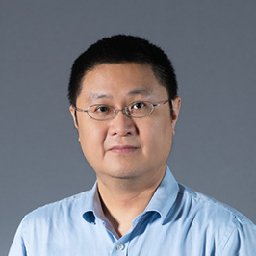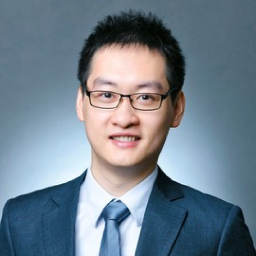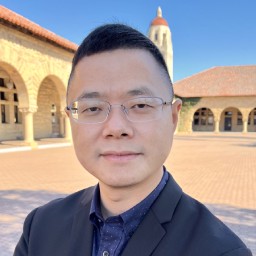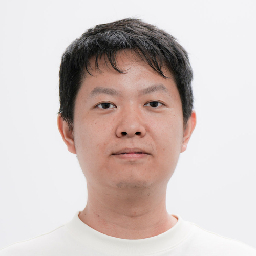Prof. Yi Ma
Professor Yi Ma is a Chair Professor in the Musketeers Foundation Institute of Data Science (HKU IDS) and Department of Computer Science at the University of Hong Kong. He took up the Directorship of HKU IDS on January 12, 2023. He is also a Professor at the Department of Electrical Engineering and Computer Sciences at the University of California, Berkeley.
Professor Ma received his Bachelor’s degrees in Automation and Applied Mathematics from Tsinghua University in 1995, two Masters degrees in EECS and Mathematics in 1997, and a PhD degree in EECS from UC Berkeley in 2000. He has been on the faculty of UIUC ECE from 2000 to 2011, the principal researcher and manager of the Visual Computing group of Microsoft Research Asia from 2009 to 2014, and the Executive Dean of the School of Information Science and Technology of ShanghaiTech University from 2014 to 2017. He then joined the faculty of UC Berkeley EECS in 2018. He has published about 60 journal papers, 120 conference papers, and three textbooks in computer vision, generalized principal component analysis, and high-dimensional data analysis. He received the NSF Career award in 2004 and the ONR Young Investigator award in 2005. He also received the David Marr prize in computer vision from ICCV 1999 and best paper awards from ECCV 2004 and ACCV 2009. He has served as the Program Chair for ICCV 2013 and the General Chair for ICCV 2015. He is a Fellow of IEEE, ACM, and SIAM.
Prof. Dong Xu
Dong Xu received the B.Eng. and PhD degrees from University of Science and Technology of China (USTC), in 2001 and 2005, respectively. While pursuing the PhD degree, he worked at Microsoft Research Asia as an intern and The Chinese University of Hong Kong as a research assistant for more than two years. He also worked as a postdoctoral research scientist at Columbia University, a tenure-track and tenured faculty member at Nanyang Technological University, and Chair in Computer Engineering at The University of Sydney.
His current research interests include computer vision, multimedia, and machine learning. His group has developed new machine learning methods and intelligent systems for a broad range of vision and multimedia related applications such as autonomous driving, AR/VR, video compression and surveillance, as well as medical image analysis. He has published more than 150 papers in IEEE Transactions and leading conferences including CVPR, ICCV, ECCV, ICML, ACM MM and MICCAI. His co-authored works (with his former PhD students) received the Best Student Paper Award in CVPR 2010 and the IEEE Transactions on Multimedia Prize Paper Award in 2014.
He is/was on the editorial boards of ACM Computing Surveys, IEEE Transactions including T-PAMI, T-IP, T-NNLS, T-CSVT and T-MM, and other five journals, and served as a guest editor of more than ten special issues in multiple journals (e.g., IJCV, IEEE/ACM Transactions). He will serve/served as the Program Coordinator of ACM Multimedia 2024, a steering committee member of ICME (2016-2017) and a Program Co-chair of five international conferences/workshops (e.g., ACM Multimedia Asia 2021, MLSP 2021 and ICME 2014). He was also involved in the organization committees of many international conferences and served as an area chair of leading conferences such as ICCV, CVPR, ECCV, ACM MM and AAAI. He received the Best Associate Editor Award of T-CSVT in 2017. He is a Foreign Member of the Academia Europaea and a Fellow of the IEEE and IAPR.
His current research interests include computer vision, multimedia, and machine learning. His group has developed new machine learning methods and intelligent systems for a broad range of vision and multimedia related applications such as autonomous driving, AR/VR, video compression and surveillance, as well as medical image analysis. He has published more than 150 papers in IEEE Transactions and leading conferences including CVPR, ICCV, ECCV, ICML, ACM MM and MICCAI. His co-authored works (with his former PhD students) received the Best Student Paper Award in CVPR 2010 and the IEEE Transactions on Multimedia Prize Paper Award in 2014.
He is/was on the editorial boards of ACM Computing Surveys, IEEE Transactions including T-PAMI, T-IP, T-NNLS, T-CSVT and T-MM, and other five journals, and served as a guest editor of more than ten special issues in multiple journals (e.g., IJCV, IEEE/ACM Transactions). He will serve/served as the Program Coordinator of ACM Multimedia 2024, a steering committee member of ICME (2016-2017) and a Program Co-chair of five international conferences/workshops (e.g., ACM Multimedia Asia 2021, MLSP 2021 and ICME 2014). He was also involved in the organization committees of many international conferences and served as an area chair of leading conferences such as ICCV, CVPR, ECCV, ACM MM and AAAI. He received the Best Associate Editor Award of T-CSVT in 2017. He is a Foreign Member of the Academia Europaea and a Fellow of the IEEE and IAPR.
Prof. Ping Luo
Ping Luo is an Associate Professor in the Department of Computer Science at the University of Hong Kong, an Associate Director of the HKU Musketeers Foundation Institute of Data Science (HKU IDS), and a Deputy Director of the Joint Research Lab of HKU and Shanghai AI Lab. He obtained his Ph.D. in Information Engineering from the Chinese University of Hong Kong in 2014, under the supervision of Prof. Xiaoou Tang (founder of SenseTime) and Prof. Xiaogang Wang. Before joining HKU in 2019, he was a Research Director in SenseTime. He has published 100+ papers in international conferences and journals such as TPAMI, ICML, ICLR, NeurIPS, and CVPR, with over 50,000 citations on Google Scholar. He was awarded the 2015 AAAI Easily Accessible Paper, nominated for the 2022 Computational Visual Media Journal's Best Paper of the Year, won the 2022 ACL Outstanding Paper, the 2023 World Artificial Intelligence Conference (WAIC) Outstanding Papers, and was a candidate for the Best Paper at ICCV’23. He was recognized as one of the innovators under 35 in the Asia-Pacific region by the MIT Technology Review (MIT TR35) in 2020. He has mentored 30 Ph.D. students, many of whom have received significant awards such as the Nvidia Fellowship, Baidu Fellowship, WAIC Yunfan Award, etc.
Prof. Shenghua Gao
Professor Shenghua Gao is an Associate Professor at the School of Computing and Data Science, The University of Hong Kong. Prior to joining HKU, Professor Gao was a Professor at the ShanghaiTech University, China. He received his B.E. degree from University of Science and Technology of China in 2008 and his Ph.D. degree from Nanyang Technological University in 2012.
Between June 2012 and August 2014, he worked as a research scientist at UIUC Advanced Digital Sciences Center in Singapore. He joined ShanghaiTech University in 2014. His research interests include 3D reconstruction, image generation, and video understanding. He has been awarded the Microsoft Research Fellowship, ACM Shanghai Young Research Scientist, Shanghai Excellent Academic Leader, Shanghai Teaching Achievements award and National Young Talents award. He has published over 120 peer-reviewed papers with a total citation count of 14,800+ (source: Google scholar) and an H-index 51. He has served as an area chair for many top-tier AI conferences, including NeurIPS, CVPR, ICCV, and AAAI. He is a publicity chair of CVPR 2024. He is/was an associate editor for IEEE TPAMI(2023-), IEEE TCSVT (2018-2022) and Neurocomputing(2018-).
Between June 2012 and August 2014, he worked as a research scientist at UIUC Advanced Digital Sciences Center in Singapore. He joined ShanghaiTech University in 2014. His research interests include 3D reconstruction, image generation, and video understanding. He has been awarded the Microsoft Research Fellowship, ACM Shanghai Young Research Scientist, Shanghai Excellent Academic Leader, Shanghai Teaching Achievements award and National Young Talents award. He has published over 120 peer-reviewed papers with a total citation count of 14,800+ (source: Google scholar) and an H-index 51. He has served as an area chair for many top-tier AI conferences, including NeurIPS, CVPR, ICCV, and AAAI. He is a publicity chair of CVPR 2024. He is/was an associate editor for IEEE TPAMI(2023-), IEEE TCSVT (2018-2022) and Neurocomputing(2018-).
Prof. Qingpeng Zhang
Prof. Qingpeng ZHANG is an Associate Professor in the Musketeers Foundation Institute of Data Science and the Department of Pharmacology and Pharmacy at HKU. He received the B.S. degree in Automation from Huazhong University of Science and Technology in 2009, and the M.S. and the Ph.D. degrees in Systems and Industrial Engineering (minor in Management Information Systems) from the University of Arizona, in 2011 and 2012, respectively. Prior to joining HKU in 08/2023, he was an Associate Professor with the School of Data Science at The City University of Hong Kong (CityU). He previously worked as a Postdoctoral Research Associate in the Tetherless World Constellation, Department of Computer Science at Rensselaer Polytechnic Institute.
He is a Senior Member of IEEE, a Fellow of the Royal Society of Medicine, and an associate/academic editor for npj Digital Medicine, BMJ Mental Health, INFORMS Journal on Data Science, IEEE TITS, IEEE TCSS, Journal of Alzheimer’s Disease (2021), and PLoS ONE. He was a theme issue editor for Philosophical Transactions of the Royal Society A: Mathematical and Engineering Sciences and the guest editor for a number of other journals. He is on the executive committee of the International Society of Digital Health, Hong Kong Society of Behavior Health, Systems Engineering Society of China, and the Hospital IoT Branch of China Association of Medical Equipment.
He is a Senior Member of IEEE, a Fellow of the Royal Society of Medicine, and an associate/academic editor for npj Digital Medicine, BMJ Mental Health, INFORMS Journal on Data Science, IEEE TITS, IEEE TCSS, Journal of Alzheimer’s Disease (2021), and PLoS ONE. He was a theme issue editor for Philosophical Transactions of the Royal Society A: Mathematical and Engineering Sciences and the guest editor for a number of other journals. He is on the executive committee of the International Society of Digital Health, Hong Kong Society of Behavior Health, Systems Engineering Society of China, and the Hospital IoT Branch of China Association of Medical Equipment.
Prof. Yanchao Yang
Dr Yanchao Yang is an Assistant Professor in the Department of Electrical and Electronic Engineering (EEE) and the HKU Musketeers Foundation Institute of Data Science (HKU-IDS). Before joining HKU, he was a Postdoctoral Research Fellow at Stanford University with Prof. Leonidas J. Guibas at the Geometric Computation Group. He received his Ph.D. from the University of California, Los Angeles (UCLA), working with Prof. Stefano Soatto. Earlier, he obtained his Master’s and Bachelor’s degrees from KAUST and USTC, respectively. He researches at the intersection of computer vision, machine learning, and robotics, with a long-term goal in developmental embodied intelligence. He currently focuses on self-supervised and semi-supervised techniques that allow autonomous agents to learn perception and representation at low-annotation regimes for physical interactions in open environments.
Prof. Bo Dai
Dr Bo Dai is an Assistant Professor in the Musketeers Foundation Institute of Data Science, The University of Hong Kong. He obtained his PhD degree from The Chinese University of Hong Kong, working with Prof. Dahua Lin. His research interests include Generative AI and its interdisciplinary applications in areas covering Embodied AI, Scientific Discovery, Metaverse and Creativity. His representative works include AnimateDiff, a pioneering work and milestone in video generation, as well as a leading research series in city-scale scene reconstruction and rendering such as CityNeRF, GridNeRF, LandMark, and Scaffold-GS. He is an Area Chair of NeurIPS2024 and AAAI 2021.
Prof. Hongyang Li
Professor Li is an Assistant Professor at HKU Musketeers Foundation Institute of Data Science, The University of Hong Kong and the Director of OpenDriveLab (opendrivelab.com) since 2021. His research focus is on Autonomous Driving and Embodied AI. He led the end-to-end autonomous driving project in 2022, UniAD and won the IEEE CVPR 2023 Best Paper Award. UniAD has a large impact both in academia and industry, including the recent rollout to customers by Tesla in FSD V12, V13 in 2024. He proposed the bird’s-eye-view perception work, BEVFormer, that won Top 100 AI Papers in 2022 and was explicitly recognized by Jensen Huang, CEO of NVIDIA and Prof. Shashua, CEO of Mobileye at public Keynote. He is the Area Chair for CVPR, NeurIPS, ICLR, ICCV, ICML, including the Notable Area Chair for NeurIPS 2023. He serves as Referee for Nature Communications, Guest Editor at SAE China Automotive Innovations. He will act as Workshop Chair for CVPR 2026. He is the Working Group Chair for IEEE Standards under Vehicular Technology Society and Senior Member of IEEE.







